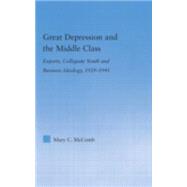- ISBN: 9780415979702 | 0415979706
- Cover: Hardcover
- Copyright: 7/25/2006
This book examines how middle-class expert authors and collegiate youths collaboratively constructed a discourse that organized a shared sense of middle-class identity during the Great Depression. Many historians have contended that discourse in America took a leftward turn during the economically turbulent 1930s and that Americans embraced the rhetoric of the labor movement. McComb argues that college students and experts adopted the language of the marketplace, the logic of capitalism, and the process of self-commodification to make sense of their situation and to erect social barriers to protect a threatened middle-class status. Using expert-authored texts, mass-marketed advice manuals, and newspapers from Amherst College, George. Washington University, Howard University, Mount Holyoke College, and the University of Michigan, the author elucidates how undergraduates willingly engaged in the defining process of attending college in order to prove themselves as valuable commodities who were worthy of earningacademic honors, pledging to Greek organizations, taking on leadership roles on campus, or becoming popular with their peers. Middle-class youths and experts, she argues persuasively, embraced the notion that aligning themselves with the corporate order would protect them from the worst effects of the Depression and that the language of the marketplace and business ideology bled over into the realms of fraternity and sorority life, rating and dating, and marriage and family life.






